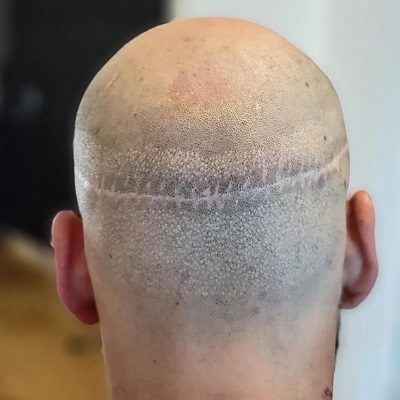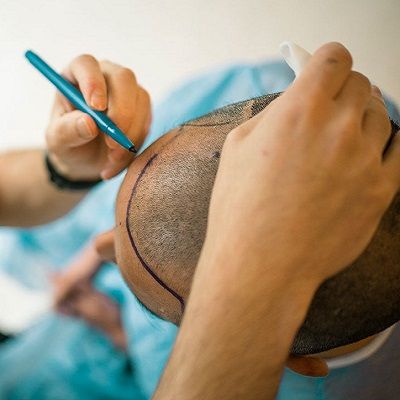
This blog will answer the most common question “Is Hair Transplant Haram or Halal” asked by many Muslim candidates who want to undergo this procedure. Yes, Hair Transplant is Halal(permissible) in Islam, but there are some important things that you need to understand and some conditions when some related hair enhancements are not acceptable. Continue reading this blog for a more detailed answer.
Is Hair Transplant Haram?
A hair transplant is a procedure in which healthy hair from the back of your head is harvested and then transplanted in the area with less hair i.e. scalp. Hair fall is a medical condition most common in men which reduces the hair from their head. The HTP procedure reverts that and makes you look better again, there is no ruling against this in Islam. So hair transplant is not Haram in Islam.
Which Hair is Allowed?
In Islam, most scholars explain the states of hair which are mentioned below:
Permissible Hair Use in Islam
- Own Hair:
Hair from one’s own body, such as the head, beard, or chest, is permissible (Halal) to use for various purposes, including Hair Transplant in Dubai.
Impermissible Hair Use in Islam
- Other People’s Hair:
Using hair from another person’s body for hair transplants or other cosmetic procedures is generally not permitted in Islam. This is based on the principle of avoiding imitation of non-believers and maintaining one’s natural appearance.
- Animal Hair:
Using animal hair for cosmetic purposes is not permissible in Islam. This is because it is considered a form of imitation and alteration of one’s natural appearance, which may be frowned upon. But scientifically animal hair can not be used for a Hair Transplant.
Haram Vs Halal:
Halal means something that you can do and is not permissible and haram means something to stay away from and not to perform. Regarding hair procedures, the details are mentioned below:
Halal Hair Procedures:
Almost all of the hair transplant techniques that are performed nowadays are halal in Islam, This involves modern techniques like FUE. Women can also undergo these procedures monitored by female staff and female Dermatologists. Also, the areas of harvesting can be from any part of the body but the back of the head will be the best option for you.
Techniques:
- FUE.
- FUT.
- PRP sessions.
- Beard Hair Transplant.
- Full Scalp Hair Transplant.
- Laser Hair Therapy.
Haram Hair Enhancements:
Some hair enhancements are haram in Islam mostly which involve using the hair of another human. These involve the temporary hair enhancements like:
- Extensions of Human Hair.
- Wigs of Human Hair.
- Human Hair Weaves.
- Styling Products with Alcohol.
Supporting Hadith:
There are multiple hadith of the Messenger of Allah Muhammad (P.B.U.H) justifying that to remove or make the defects better caused by any accidents, some relevant Hadith are mentioned below:
Hadith:
It is permissible in Sharia to undergo cosmetic surgery to remove a defect that is caused by an accident or the like, or a defect which is by birth, or to reduce signs of aging, or for beautification. This is based on the Hadith in which the Prophet permitted a person whose nose was cut off to replace it with a nose of gold.
That Hadith reads as follows: Narrated ‘Urfajah bin As’ad: “My nose was severed on the Day of Al-Kulab during Jahiliyyah. So I got a nose of paper that caused me an infection, so the Messenger of Allah (PBUH) ordered me to get a nose made of gold.”
{Reference: Jami` at-Tirmidhi 1770}.
OIC Conference in 2007:
It says in a statement of the Islamic Fiqh Council belonging to the Organisation of the Islamic Conference (OIC), which was held during its eighteenth session in Malaysia, 24-29 Jumada al-Akhirah 1428 AH/9-14 July 2007 CE regarding cosmetic surgeries, explaining what is permissible of such procedures:
It is permissible according to Islamic teachings to do essential cosmetic surgeries for the following purposes:
- Restoring the appearance of a body part to the state in which it was created, because Allah, may He be glorified, says (interpretation of the meaning): {We have certainly created man in the best of stature} [at-Tin 95:4].
- Restoring the usual function of a body part.
- Repairing congenital defects such as cleft palate (harelip), severely crooked nose, and birthmarks, removing extra fingers and teeth, and separating fused fingers, if their presence leads to physical or psychological harm.
- Repairing accidental (acquired) defects resulting from burns, accidents, sickness, and other causes, such as skin transplants and grafting, reshaping the breast completely if it has been removed completely or partially, if its size is so large or small that it leads to a pathological condition, and hair transplant in the event of hair loss, especially for women.
- Removing a congenital deformity that causes psychological or physical harm to a person. End quote.
The main surgeries that are Permissible and those that are not according to this conference are:
Specific Permissible Plastic Surgeries:
- Restorative Surgery:
- To restore the original form or function of body parts.
- To correct congenital defects like cleft lip or extra fingers.
- To repair damage caused by accidents or diseases.
- Medical Necessity:
- To address severe physical or psychological distress caused by unusual appearances like hair fall.
- To reduce morbid obesity through safe procedures like liposuction.
Impermissible Plastic Surgeries
- Cosmetic Surgery:
- Altering appearance for vanity or to imitate others.
- Changing facial features like nose, lips, or eyes.
- Harmful Procedures:
- Risky procedures with significant potential for harm.
- Procedures that violate Islamic values like excessive beautification or imitating the opposite gender.
End Note:
We tried to explain “Is Hair Transplant Haram?” with proper references and reasons related to Islamic Laws and Shariah. We didn’t claim anything that is not explained in Islamic teachings already and didn’t mention anything from unbiased sources. We hope that this blog answers this question in detail accordingly.
FAQ’s:
Are there any prohibited areas for transplants?
No hair can be harvested and transplanted from all parts of the body.
Are there any techniques that are haram?
No, all hair transplant techniques are halal in Islam.
Is there any Islamic way to regrow hair?
No there isn’t any proper technique available but there are some herbal oils that can help you.
Can you offer Namaz after HTP?
Yes, you can offer namaz while sitting, and the way you are easy. Avoid putting any strain and you can ask your doctor for more guidance.


































